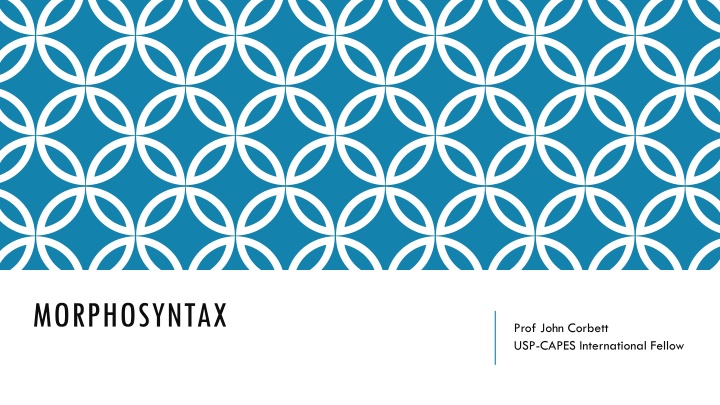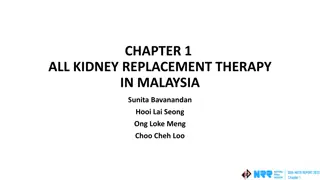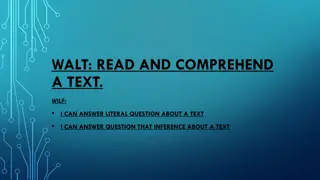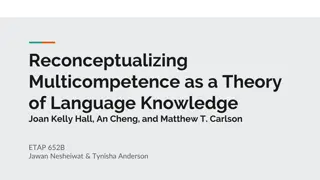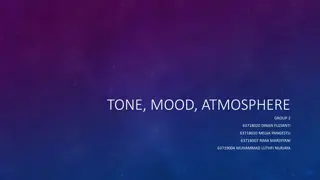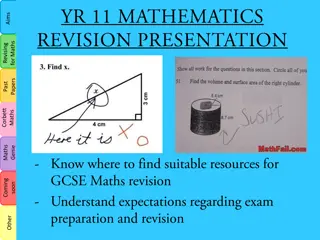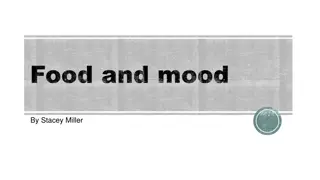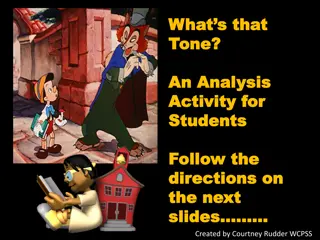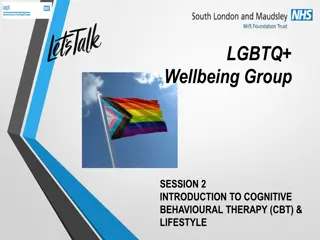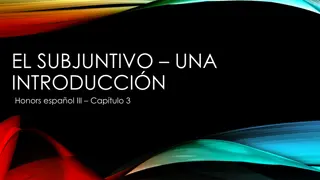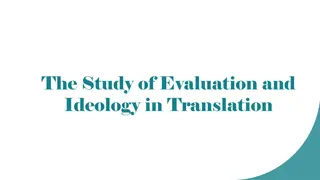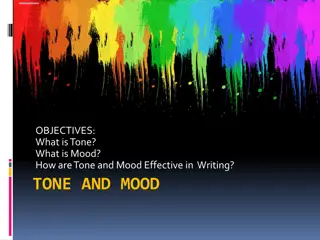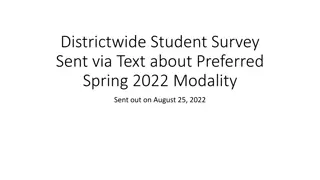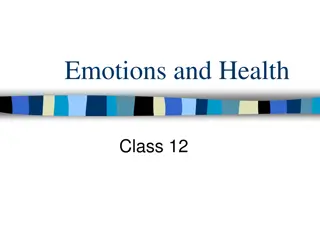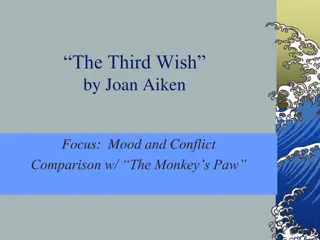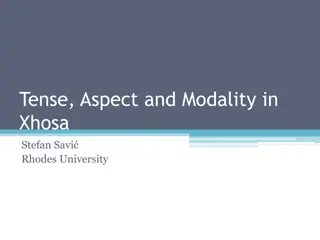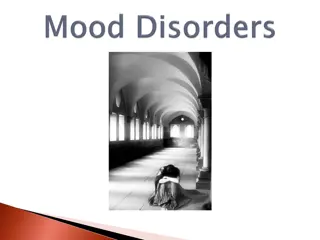Mood and Modality in Morphosyntax with Prof. John Corbett
Today's session with Prof. John Corbett explores the final three sets of grammatical categories related to verbs: mood (fact or non-fact), modality (speaker's stance), and voice (subject's role). The session delves into the present-day English mood system, differentiating between various realizations like imperative, interrogative, declarative, and indicative. Additionally, the fossilized mood of the subjunctive in English is discussed, highlighting its presence in idiomatic expressions and subordinate clauses. Modality in English is explained as a two-part system where a verb can be unmodalized (positive or negative).
Download Presentation

Please find below an Image/Link to download the presentation.
The content on the website is provided AS IS for your information and personal use only. It may not be sold, licensed, or shared on other websites without obtaining consent from the author.If you encounter any issues during the download, it is possible that the publisher has removed the file from their server.
You are allowed to download the files provided on this website for personal or commercial use, subject to the condition that they are used lawfully. All files are the property of their respective owners.
The content on the website is provided AS IS for your information and personal use only. It may not be sold, licensed, or shared on other websites without obtaining consent from the author.
E N D
Presentation Transcript
MORPHOSYNTAX Prof John Corbett USP-CAPES International Fellow
TODAYS SESSION The final three sets of grammatical categories relating to verbs: mood (is the statement fact or non-fact?) modality (what is the speaker s stance towards the statement?) voice (is the Subject of the sentence performing the action or is it affected by the action?) These are all sentence-level issues but they impact on the form of the verb.
THE MOOD SYSTEM IN PRESENT DAY ENGLISH The present day English category of mood can be understood as a set of realizations. Can you match the sentence up with its possible descriptions? Possible realisations Hurry up! What are you doing? My name's Jim. ----------------------------------------------------------------------------------------------------------------- Possible labels open imperative exclusive closed interrogative inclusive Let's go. Is this the right room? declarative indicative
THE MOOD SYSTEM IN PRESENT DAY ENGLISH declarative (My name s Jim.) indicative (fact) open (What are you doing?) interrogative (asking a question) Mood closed (Is this the right room?) inclusive (Let s go.) imperative (non-fact) exclusive (Hurry up!)
A FOSSILISED MOOD As well as the imperative, English has traces of another non-fact mood, the subjunctive. In a range of languages, the subjunctive expresses hopes, desires, conditions, obligations, possibilities. In present-day English, some of these functions are realized by the modality system, but a few examples of the subjunctive mood survive in idiomatic expressions and in subordinate/dependent clauses with certain verbs and adjectives.
A FOSSILISED MOOD Traces of the subjunctive mood: In exclamations: In toasts: In formulaic expressions Lord help us! God save the king! Be that as it may far be it from me suffice it to say In subordinate clauses following verbs expressing weak/strong recommendations: I recommend/suggest/demand/insist that he leave. In subordinate clauses following adjectives/noun/verbs expressing desires/suggestions: It is advisable that he leave. It is a requirement that he leave. I wish I were you. In if clauses: If I were a rich man, I wouldn t have to work hard (Now normally If I was rich )
MODALITY Modality is a two-part system in English a verb can either be: Unmodalised (positive or negative) She eats nails and spits rust. She doesn t eat nails or spit rust. or Modalised (epistemic or deontic) She can/could eat nails She will/would eat nails She shall/should eat nails She may/might eat nails She has (got) to/had (got) to eat nails She ought to eat nails She must eat nails
EPISTEMIC OR DEONTIC? Epistemic: to do with possibility, necessity and ability (what we can know). Deontic: to do with permission and obligation.
MODAL MEANINGS (1) Speaker s assessment of possibility (here, modal + perfect aspect): I could have left my phone in the cinema. I might have left my phone in the cinema. I may have left my phone in the cinema. I must have left my phone in the cinema. I ll have left my phone in the cinema. Increasing likelihood
MODAL MEANINGS (2) Speaker s assessment of ability (to do something): I could win this game I can win this game. (3) Permission: You may leave early. You can leave early Might I leave early?
MODAL MEANINGS Obligation There has (got) to be a referendum. There ought to be a referendum. There should be a referendum. There must be a referendum. There shall be a referendum. (insistence) (external pressure) (external pressure) (internal pressure) (decree)
THE VOICE SYSTEM Voice is a 2-part system: active versus passive voice. I want to tell you something I ve broken your car window. Your car window has been broken (by me). Passive transformation: Object becomes Subject VERB becomes TO BE + PAST PARTICIPLE (-en) 12
ANOTHER FORM OF THE PASSIVE GET + past participle They got married in a registry office. They were married in a registry office. When do we use the get passive? Less formal discourse. Arguable the get passive focuses on the action & the be passive focuses on the resulting state of affairs: The senator was caught embezzling funds. (Focus on the senator) The senator got caught embezzling funds. (Focus on the catching)
ERGATIVITY Some verbs can be used in the active voice but have passive meanings. The action is realized through the subject of the verb: The door opened. The door was opened. Flight KL 098 is now boarding at gate 3. The flight is being boarded These oranges peel easily. These oranges are peeled
WHY DO WE NEED THE SYSTEM OF VOICE? To negotiate responsibility (delete the Agent, move information around.) When we do not know the Agent (My house has been burgled.) When we want to obscure the Agent (Your essay has been mislaid.) To manage information flow : The first item on the programme was a song. The song was sung by a girl. The first item on the programme was a girl. The girl sang a song. Given info>New info. 15
WHY DO WE NEED THE SYSTEM OF VOICE? To manage information flow : The first item on the programme was a song. The song was sung by a girl. The first item on the programme was a girl. The girl sang a song. Given info>New info. 16
VERBS AND POINT-OF-VIEW She kissed him. He was kissed by her. They kissed. Suddenly there were his lips on her neck.
VERBS AND POINT-0F-VIEW From The Inheritors by William Golding (interpretation by MAK Halliday)
VERBS AND POINT-OF-VIEW These come from (allegedly real) reports of traffic accidents, sent to insurance companies by clients claiming compensation. What is interesting about the verb choices? a) A pedestrian hit me and went under my car. (b) As I approached the intersection, a sign appeared in a place where no sign had ever appeared before. (c) My car was legally parked as it backed into the other vehicle. (d) I saw a sad-faced, slow-moving old gentleman, as he bounced off the roof of my car.
VERBS AND POINT-OF-VIEW These come from (allegedly real) reports of traffic accidents, sent to insurance companies by clients claiming compensation. What is interesting about the verb choices? a) A pedestrian hit me and went under my car. (Active voice where passive would be more natural . Responsibility put on the pedestrian.) (b) As I approached the intersection, a sign appeared in a place where no sign had ever appeared before. (Inanimate subject sign but verb of action.) (c) My car was legally parked as it backed into the other vehicle. (Stative verb was parked at the same time as verb of action backed .) (d) I saw a sad-faced, slow-moving old gentleman, as he bounced off the roof of my car. (Incongruity of the person perceived as slow-moving as he bounces .)
VERB SYSTEMS: PUTTING IT ALL TOGETHER was sleeping: number: person: tense: aspect: voice: finiteness: modality: mood: singular third past progressive active finite non-modalised indicative 21
VERB SYSTEMS: PUTTING IT ALL TOGETHER should have been being trained tense: aspect: voice: finiteness: modality: mood: past perfect progressive (have...being) passive (been trained) finite (tense is marked) modalised (should) indicative (statement of fact) (should, not shall) 22
FINAL THOUGHTS You can now explain a number of grammatical categories that apply to: Nouns (number, gender, case, person and definiteness) Pronouns (number, gender, case and person) Adjectives and some adverbs (degree) Verbs (number, person, tense, aspect, finiteness, mood, modality and voice).
LOOKING AHEAD Next week we turn from the description of morphosyntactic patterns and grammatical systems to the teaching of grammatical structures in second language classrooms. How were you taught grammar in school? * Explicitly or implicitly? * Inductively (from examples to rules) or deductively (from rules to examples)? * What worked/didn t work for you? Next week we start looking at issues and options for teachers of grammar.
